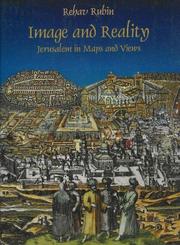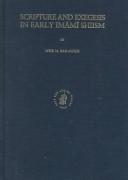| Listing 1 - 10 of 10 |
Sort by
|
Multi
Abstract | Keywords | Export | Availability | Bookmark
 Loading...
Loading...Choose an application
- Reference Manager
- EndNote
- RefWorks (Direct export to RefWorks)
Joodse muziek --- Marokko --- Levenscyclus --- Bloemlezingen --- Hebreews
Book
Abstract | Keywords | Export | Availability | Bookmark
 Loading...
Loading...Choose an application
- Reference Manager
- EndNote
- RefWorks (Direct export to RefWorks)

ISBN: 9654930129 Year: 1999 Volume: *1 Publisher: Jerusalem The Hebrew University Magnes Press
Abstract | Keywords | Export | Availability | Bookmark
 Loading...
Loading...Choose an application
- Reference Manager
- EndNote
- RefWorks (Direct export to RefWorks)
913.3 --- 933 JERUSALEM --- Aardrijkskunde van Palestina --- Geschiedenis van Palestina en het Joodse volk--JERUSALEM --- #A0308HI --- 933 JERUSALEM Geschiedenis van Palestina en het Joodse volk--JERUSALEM --- Jerusalem --- Ierusalim --- Yerushalayim --- Jeruzalem --- Quds --- Ūrushalīm --- Kuds --- Kouds --- Erusaghēm --- Bayt al-Maqdis --- Jeruzsálem --- Jerusalem (Israel) --- Jerusalem (Palestine) --- ʻIriyat Yerushalayim --- Ierousalēm --- Gerusalemme --- Baladīyat al-Quds --- Baladīyat al-Quds al-ʻArabīyah --- Jerusalem Arab Municipality --- Qods (Jerusalem) --- ירושלים --- القدس --- al-Quds --- قدس --- Cartes --- Early works to 1800 --- Pictorial works --- Иерусалим --- Jerusalén
Book
Year: 1996 Publisher: Jerusalem The Magnes Press, The Hebrew University
Abstract | Keywords | Export | Availability | Bookmark
 Loading...
Loading...Choose an application
- Reference Manager
- EndNote
- RefWorks (Direct export to RefWorks)
Book
Abstract | Keywords | Export | Availability | Bookmark
 Loading...
Loading...Choose an application
- Reference Manager
- EndNote
- RefWorks (Direct export to RefWorks)
Book
Abstract | Keywords | Export | Availability | Bookmark
 Loading...
Loading...Choose an application
- Reference Manager
- EndNote
- RefWorks (Direct export to RefWorks)
Book
Abstract | Keywords | Export | Availability | Bookmark
 Loading...
Loading...Choose an application
- Reference Manager
- EndNote
- RefWorks (Direct export to RefWorks)
Book
Abstract | Keywords | Export | Availability | Bookmark
 Loading...
Loading...Choose an application
- Reference Manager
- EndNote
- RefWorks (Direct export to RefWorks)

ISBN: 9004114955 9789004114951 9789004452886 9004452885 Year: 1999 Volume: 37 Publisher: Boston Leiden Jerusalem Brill The magnes press
Abstract | Keywords | Export | Availability | Bookmark
 Loading...
Loading...Choose an application
- Reference Manager
- EndNote
- RefWorks (Direct export to RefWorks)
Since the publication in 1921 of Ignaz Goldziher's Die Richtungen der islamischen Koransauslegung , which includes a discussion of Imāmī exegesis, no comprehensive work on this topic has appeared. In the intervening years, important Imāmī commentaries on the Qur'ān have become available, making possible a reappraisal of the subject. The present study aims to contribute to this task, primarily by examining the features and methods of Imāmī exegesis. Principally, it offers a description and analysis of the major tenets of Imāmī doctrine, as reflected in the earliest Imāmī works of exegesis and related sources, up to the Major Occultation of the twelfth Imam in 329/941. These include, among others, the belief in a primordial covenant between God and the Shī'a, and the superhuman and mystical qualities with which the Imams were graced, such as their God-given, infinite knowledge, their intercession on behalf of their community, their immunity from sin and error, etc. Other tenets relate to the attitude of Imāmī Shī'ism to its enemies, e.g. the duty to denigrate and dissociate from them. These and similar ideas are constant motifs in Imāmī exegesis, and are linked time and again with various Qur'ānic verses. Relying on classical and modern Arabic sources, Sunnī and Shī'ī alike, as well as on a wide range of western research, Meir Bar-Asher sheds new light on the Imāmī methods of exegesis and on the principal Imāmī doctrines as reflected in the early Imāmī exegetical corpus.
Qur'an --- Commentaries --- History and criticism --- Criticism, interpretation, etc --- Imams (Shiites) - History. --- Shåi°ah - History. --- Imams (Shiites) --- Shiism --- History --- Imams --- Shīʻah --- Shiites --- Imamites --- Shia --- Twelvers (Islam) --- Islamic sects --- Alids --- Coran --- Imāms (chiites) --- Chiisme --- Critique, interprétation, etc. --- 10e siècle --- 11e siècle --- Histoire
Book
ISBN: 9783110564532 Year: 2018 Publisher: Boston, MA Jerusalem Walter de Gruyter Hebrew University Magnes
Abstract | Keywords | Export | Availability | Bookmark
 Loading...
Loading...Choose an application
- Reference Manager
- EndNote
- RefWorks (Direct export to RefWorks)
| Listing 1 - 10 of 10 |
Sort by
|

 Search
Search Feedback
Feedback About UniCat
About UniCat  Help
Help News
News